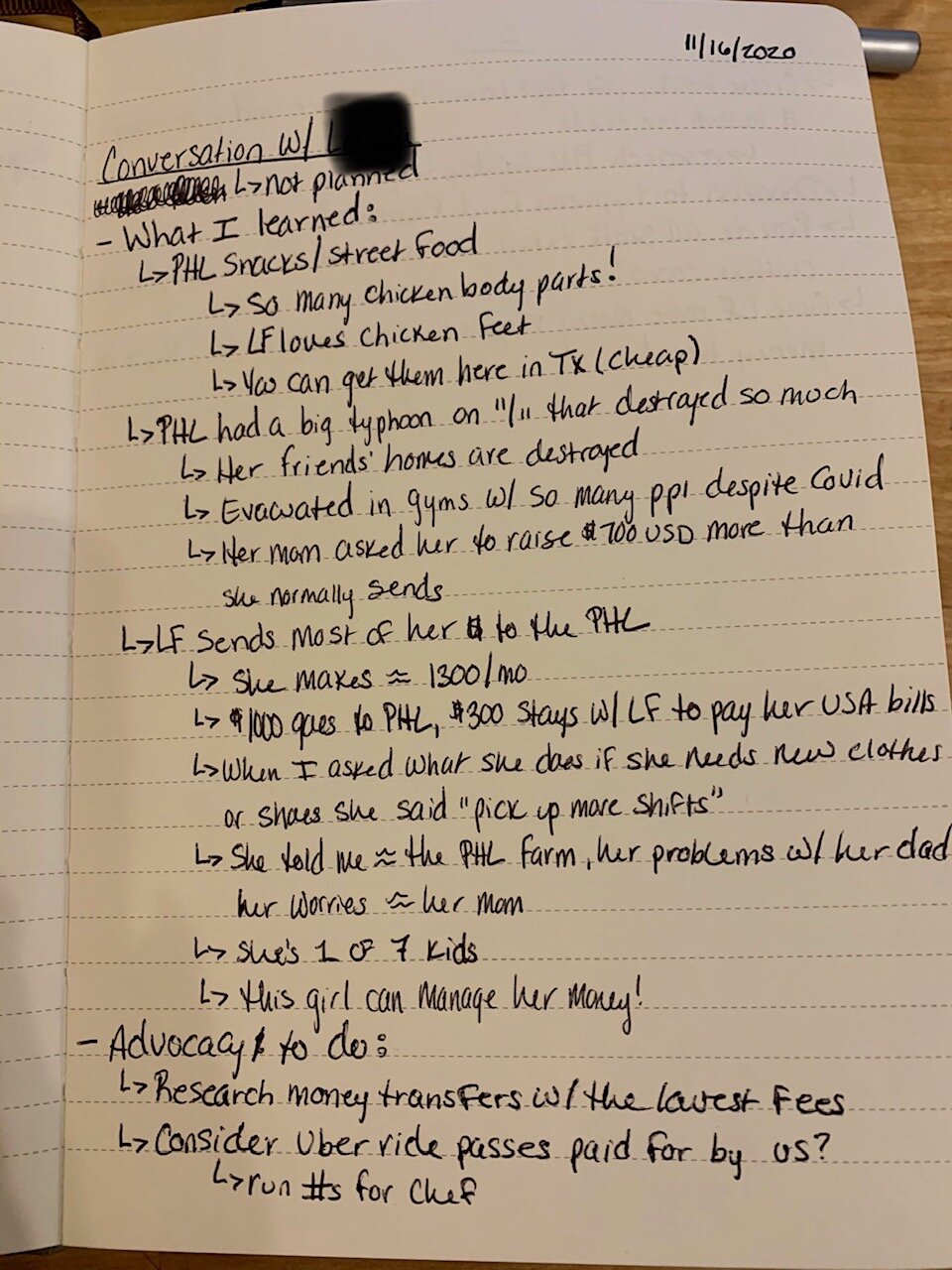When "Diversity" Leaves You Speechless
The front house shop was empty and one of the Filipino girls and I sat at a booth to eat a quick snack before the lunch rush. She pulled out her phone and started showing me Filipino street food, laughing as I tried to grasp the idea that she loved chicken feet and chicken heads as a snack.
Our conversation went from pictures of Filipino street food to pictures of the streets in the Philippines after the most recent Typhoon. She opened Facebook and showed me her friends’ houses that were destroyed, her community piled into small spaces despite the Covid19 scare, and how much her home was completely wrecked.
And I listened deeply, asked questions when it was appropriate; I treasured this vulnerable turn of conversation.
As tender conversations always seem to do, she said something that left me speechless:
My mom asked me to send home $700 more than what I normally do to help.
She went on to explain that she sends home $1000 per month and only keeps $300 of her own money every month to cover her own bills.
For those of you keeping count, she makes an average of $1300 per month and uses $300 to cover the rent she splits with 5 other people in a 2 bedroom apartment, her groceries and the Uber rides to and from work. The rest of her money goes directly to her family in the Philippines.
She is 21 years old.
And like a movie the song that started playing in the restaurant was “Speechless” by Dan and Shay, and I was completely frozen in the moment.
Frozen in her courage, her love, her work ethic, her money management, and what it meant for her to be an immigrant.
For the first time since I became the manager of this shop this Filipina told me all of the things a Latina couldn’t possibly know about the other's lived experience.
And I did not speak. I didn’t relate our experiences or try to comfort her or ask if she wanted more shifts. I just existed in the vulnerability of the moment entirely speechless.
As I have done in every moment of my HR career when those that do no look like me, believe like me, come from my background or love like me start to allow me into their worlds.
It has become painfully obvious in 2020 that humanity struggles with how to respond to one another’s lived experiences. Our responses to Black Lives Matter and Abolish ICE and Americans being on Stolen Land and Trans Rights are Human Rights reveals how ill-prepared we are for these moments.
It is more difficult to sit quietly in uncomfortable spaces. It requires a higher level of discipline to refuse to think of responses when others are sharing their pain. It takes authentic heart-work to ask probing questions to gauge the degree of someone’s pain.
Traditional Human Resources flinch when protected pain arises. When a black employee says they hurt because they’re black, traditional HR mobilizes a Title VII response that’s been vetted by legal but fully negates the human experience.
HR is so consumed with our overrun calendars that when a lived experience is finally brought up at the end of a meeting we sacrifice the probing questions and deep listening for the next color block on an electronic time keeper.
HR has stopped being speechless long ago.
When was the last time you breathed in a steady breath, looked someone in the eye across the computer from you and just kept looking? No words, just eye contact that so respectfully says: You are seen, this space is yours, I’m not going anywhere.
When was the last time you asked a question that made you uncomfortable to know the answer?
Guarded HR is dangerous. Dehumanized HR is toxic. Talkative HR is destructive.
DEI is not nearly as difficult as media wants you to believe it is; it is complex, but not difficult.
True DEI begins by giving a shit about humanity and allowing your soul to be moved to speechlessness even at work.
It begins by recognizing that the most effective risk mitigation is compassion, active listening, and speechlessness.
Once we wrapped up the conversation at the small booth in our restaurant, I pulled out the notebook I carry with me everywhere and I wrote down items in two categories: what the conversation taught me and how I could advocate for a fellow minority based on what I learned.
Because speechlessness in the moment does not mean silence forever; because silence is violence and continued ignorance is willful oppression.
In the spirit of vulnerability a picture of my notes are below, with the employee’s name blocked out for respect.
May we all be willing to allow our souls to be speechless at work this week.
Notes pg. 1
Notes pg. 2


